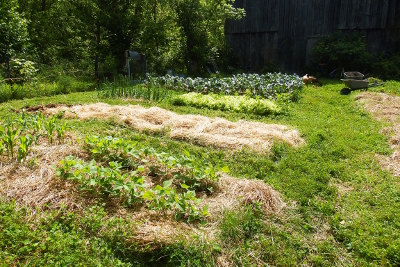
June garden check in

By the beginning of
June, the shape of the rest of the garden year is beginning to ossify.
In a perfect world, the gardener was smart enough to plant only what
she could easily manage, so spring crops are in full production while
summer crops are growing quickly beneath their mostly weed-free mulch.
 This year, I'm quite pleased
with the state of my active beds. In contrast, I was starting to get
sick at this time last year, and I let large swathes of the garden run
away from me. The result is still being felt twelve months later when
perennials (primarily strawberries and asparagus) produce at rates a
quarter to half of normal while as much of a third of previously
cultivated ground currently lies weedily fallow.
This year, I'm quite pleased
with the state of my active beds. In contrast, I was starting to get
sick at this time last year, and I let large swathes of the garden run
away from me. The result is still being felt twelve months later when
perennials (primarily strawberries and asparagus) produce at rates a
quarter to half of normal while as much of a third of previously
cultivated ground currently lies weedily fallow.
Luckily, solutions are
simple. I'm slowly solarizing the troubled spots, then will plant them
in buckwheat to bring the areas back into production a bit richer than
I found them. Meanwhile, extra weeding jobs on the perennials will do
the same for our beloved strawberries and asparagus. Slowly but surely,
the effects of being an overzealous gardener with an underzealous
energy level will disappear into our rear-view mirror as our previously
problematic garden comes back to life.
Want more in-depth information? Browse through our books.
Or explore more posts by date or by subject.
About us: Anna Hess and Mark Hamilton spent over a decade living self-sufficiently in the mountains of Virginia before moving north to start over from scratch in the foothills of Ohio. They've experimented with permaculture, no-till gardening, trailersteading, home-based microbusinesses and much more, writing about their adventures in both blogs and books.
Want to be notified when new comments are posted on this page? Click on the RSS button after you add a comment to subscribe to the comment feed, or simply check the box beside "email replies to me" while writing your comment.

Gardens represent constant states of both conflict and renewal.
I'm an old gardener now, and I have come to enjoy the benefits of garden forgiveness and renewal each season. The conflicting issues just have to take care of themselves with minimal input on my part. The produce is still good, the quantities are still acceptable, and the pleasure factor is tremendously enhanced when I stopped worrying over perfection. Frost is my friend - along with my mower.
Enjoy your gardens!